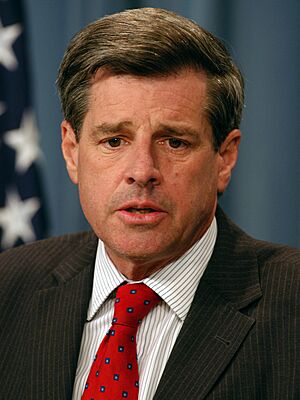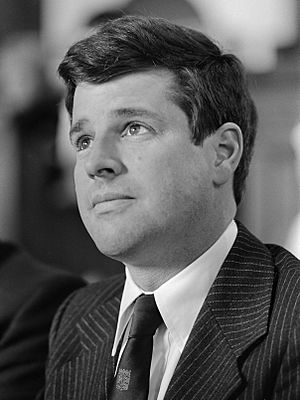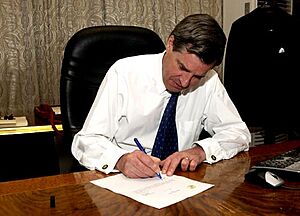Paul Bremer facts for kids
Quick facts for kids
Paul Bremer
|
|
|---|---|

Bremer in 2003
|
|
| Administrator of the Coalition Provisional Authority of Iraq | |
| In office May 12, 2003 – June 28, 2004 |
|
| President | George W. Bush |
| Deputy | Richard Jones |
| President of the IGC |
|
| Preceded by | Jay Garner (as Director of the Office for Reconstruction and Humanitarian Assistance) |
| Succeeded by | Ghazi Mashal Ajil al-Yawer (as Interim President of Iraq) |
| 6th Coordinator for Counterterrorism | |
| In office October 17, 1986 – May 25, 1989 |
|
| President | Ronald Reagan |
| Preceded by | Robert B. Oakley |
| Succeeded by | Morris Busby |
| United States Ambassador to the Netherlands | |
| In office August 31, 1983 – August 25, 1986 |
|
| President | Ronald Reagan |
| Preceded by | William J. Dyess |
| Succeeded by | John S. R. Shad |
| 9th Executive Secretary of the United States Department of State | |
| In office February 2, 1981 – March 27, 1983 |
|
| President | Ronald Reagan |
| Preceded by | Peter Tarnoff |
| Succeeded by | Charles Hill |
| Personal details | |
| Born |
Lewis Paul Bremer III
September 30, 1941 Hartford, Connecticut, U.S. |
| Political party | Republican |
| Spouse | |
| Children | 2 |
| Education | |
Lewis Paul Bremer III (born September 30, 1941) is an American diplomat who is now retired. He was a very important leader in Iraq after the 2003 invasion of Iraq by the United States. From May 2003 to June 2004, he led the Coalition Provisional Authority (CPA). This made him the main person in charge of Iraq during that time.
Early Life and School
Paul Bremer was born on September 30, 1941, in Hartford, Connecticut. He went to several schools, including Kent School and Phillips Academy Andover. His father was in charge of a perfume company, and his mother taught art history at a university.
Bremer studied at Yale University and graduated in 1963. He then earned a master's degree in business from Harvard University in 1966. He also continued his studies in Paris, France, where he earned a special certificate in political studies.
Career as a Diplomat
Starting in Foreign Service
In 1966, Paul Bremer joined the United States Foreign Service. This is a group of people who work for the U.S. government in other countries. His first job was in Kabul, Afghanistan. Later, he worked in Blantyre, Malawi, from 1968 to 1971. There, he focused on economic and business matters.
Working in the U.S. State Department
During the 1970s, Bremer held different jobs at the U.S. State Department in Washington, D.C. He was an assistant to Henry Kissinger, a very famous diplomat, from 1972 to 1976. He traveled with Kissinger to help solve problems after the Yom Kippur War in 1973.
He also worked in Oslo, Norway, from 1976 to 1979. After that, he returned to the U.S. State Department. In 1981, he became the executive secretary and special assistant to another important leader, Alexander Haig.
Ambassador Roles
In 1983, President Ronald Reagan chose Bremer to be the U.S. Ambassador to the Netherlands. Later, in 1986, he became an ambassador who focused on fighting terrorism. He was known as the Coordinator for Counterterrorism.
After Government Service
Working in Private Companies
Bremer left the Foreign Service in 1989. He then worked at a global consulting company called Kissinger and Associates. This company was started by Henry Kissinger. Bremer was a senior member of the Foreign Service and received several awards for his excellent work.
Before returning to government work in 2003, he was the head of Marsh Crisis Consulting. This company helps businesses with risks and insurance. He also served on the boards of several other companies and organizations.
Bremer's office was in the World Trade Center in New York City. He was there during the September 11 attacks. He later spoke about his experience on TV.
Bremer and his wife also started a group called the Lincoln/Douglass Scholarship Foundation. This group helps inner-city high school students get scholarships.
Helping Fight Terrorism
In 1999, Bremer was chosen to lead the National Commission on Terrorism. This group wrote a report in 2000 about how to fight international terrorism. He also worked with the National Academy of Sciences on a report about how science and technology could help make the nation safer from terrorism.
Leading the Coalition in Iraq
On May 9, 2003, President George W. Bush appointed Bremer as his special representative to Iraq. He arrived in Iraq in May 2003. On May 11, he took over from Lt. General Jay Garner as the head of the Office for Reconstruction and Humanitarian Assistance.
In June, this office became the Coalition Provisional Authority (CPA), and Bremer became the main leader in Iraq. He was given a lot of power to make decisions. He made some important rules, like banning the Ba'ath party and ending the Iraqi Army.
On July 13, 2003, Bremer helped create the Iraqi Interim Governing Council. This council was meant to represent the Iraqi people. Bremer chose the members of this council. He also had the power to say no to their ideas.
Bremer also worked on creating a new constitution for Iraq. After many discussions, an interim constitution was signed on March 8, 2004. This constitution was meant to be updated later after elections in Iraq.
On June 28, 2004, the U.S.-led Coalition Provisional Authority officially gave some control back to the Iraqi Interim Government. This happened two days earlier than planned. Bremer left Iraq on the same day. In his farewell speech, he said he was happy with what had been done and believed Iraq had a hopeful future.
Bremer's office was part of the U.S. Department of Defense. He reported directly to the Secretary of Defense and the President. After Bremer left, John Negroponte became the highest-ranking American civilian in Iraq.
After Iraq
After returning from Iraq, Bremer gave several speeches. On December 14, 2004, President Bush gave him the Presidential Medal of Freedom. This is America's highest award for people who make important contributions to the country or world peace.
Bremer also wrote a book in 2006 called My Year in Iraq: The Struggle to Build a Future of Hope. This book shared his experiences and thoughts about his time leading the CPA.
Hobbies and Other Work
After taking art lessons, Bremer started painting landscapes in 2007. He sells his oil paintings through his company, Bremer Enterprises. The money he earns goes to historical societies in Vermont, where he moved after retiring.
He also published another book in 2011 called From Sea to Shining Sea: Biking Across America with Wounded Warriors. This book is about biking across America with injured soldiers.
Bremer also worked as a ski instructor at Okemo Mountain Resort in Vermont for several seasons. He continues to do consulting work and serves on various boards. In 2010, he became the CEO and President of World T.E.A.M. Sports, a non-profit organization. He retired from that role in 2012.
Internet Fame
Bremer is part of a popular internet meme. His phrase "Ladies and gentlemen, we got him," which he said after the capture of Saddam Hussein, is used in funny videos. He was interested to learn about this trend and hoped it would make more people curious about Iraq's history.
See also
 In Spanish: Paul Bremer para niños
In Spanish: Paul Bremer para niños



